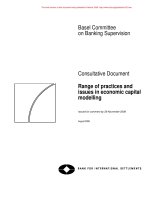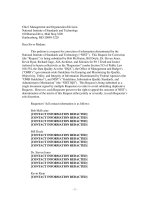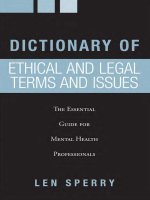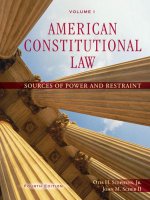DICTIONARY OF ETHICAL AND LEGAL TERMS AND ISSUES pptx
Bạn đang xem bản rút gọn của tài liệu. Xem và tải ngay bản đầy đủ của tài liệu tại đây (2.47 MB, 292 trang )
DICTIONARY OF
ETHICAL AND LEGAL
TERMS AND ISSUES
RT53227.indb 1 10/9/06 9:54:36 AM
RT53227.indb 2 10/9/06 9:54:36 AM
DICTIONARY OF
ETHICAL AND LEGAL
TERMS AND ISSUES
The Essential
Guide for
Mental Health
Professionals
L E N S P E R R Y
RT53227.indb 3 10/9/06 9:54:37 AM
Routledge
Taylor & Francis Group
270 Madison Avenue
New York, NY 10016
Routledge
Taylor & Francis Group
2 Park Square
Milton Park, Abingdon
Oxon OX14 4RN
© 2007 by Taylor & Francis Group, LLC
Routledge is an imprint of Taylor & Francis Group, an Informa business
Printed in the United States of America on acid‑free paper
10 9 8 7 6 5 4 3 2 1
International Standard Book Number‑10: 0‑415‑95322‑7 (Softcover) 0‑415‑95321‑9 (Hardcover)
International Standard Book Number‑13: 978‑0‑415‑95322‑1 (Softcover) 978‑0‑415‑95321‑4 (Hardcover)
No part of this book may be reprinted, reproduced, transmitted, or utilized in any form by any electronic,
mechanical, or other means, now known or hereafter invented, including photocopying, microfilming,
and recording, or in any information storage or retrieval system, without written permission from the
publishers.
Trademark Notice: Product or corporate names may be trademarks or registered trademarks, and are
used only for identification and explanation without intent to infringe.
Library of Congress Cataloging‑in‑Publication Data
Sperry, Len.
Dictionary of ethical and legal terms and issues : the essential guide for mental
health professionals / Len Sperry.
p. ; cm.
Includes bibliographical references and index.
ISBN 0‑415‑95321‑9 (hb : alk. paper) ‑‑ ISBN 0‑415‑95322‑7 (pb : alk. paper)
1. Psychiatric ethics. 2. Forensic psychiatry. 3. Psychiatric ethics‑‑Dictionaries. 4.
Forensic psychiatry‑‑Dictionaries. I. Title.
[DNLM: 1. Psychiatry‑‑ethics. 2. Psychiatry‑‑legislation & jurisprudence. 3.
Ethics, Professional. 4. Terminology. WM 21 S751d 2007]
RC455.2.E8S655 2007
174.2‑‑dc22 2006014597
Visit the Taylor & Francis Web site at
and the Routledge Web site at
RT53227.indb 4 10/9/06 9:54:37 AM
v
CONTENTS
Acknowledgments vii
Introduction ix
Part I: Dictionary of Ethical and Legal Terms 1
Part II: Ethical Issues and Considerations 103
Part III: Legal Issues and Considerations 163
Appendix: Key Legal Cases and Legislation Impacting Mental
Health Practice 253
Index 263
RT53227.indb 5 10/9/06 9:54:38 AM
RT53227.indb 6 10/9/06 9:54:38 AM
vii
ACKNOWLEDGMENTS
The decision to plan, write, review, revise, and publish a professional
book is a long and complex process involving multitudes of individuals
besides the stated author. I’ve been extraordinarily blessed to have teamed
up with the visionary publishing director at Routledge, George Zimmar,
Ph.D., who immediately grasped the potential value of the concept of this
book and worked with me to fashion and rene it into its present form.
Thanks, George.
Over the past few years I’ve had the opportunity to share ideas about
ethical and legal practice with several colleagues and I would like to rec-
ognize them: Michael Gottlieb, Ph.D., Dennis Engels, Ph.D., Mike Robin-
son, Ph.D., James R. Bitter, Ed.D., Maureen Duffy, Ph.D., Carl Chan, M.D.,
Joe Layde, M.D., J.D., Michael Frain, Ph.D., Larry Kontosh, Ph.D., Alex O.
Miranda, Ph.D., Paul R. Peluso, Ph.D., Bill Nicoll, Ph.D, Greg Brigman,
Ph.D., and Linda Webb, Ph.D. Furthermore, a number of highly regarded
ethics and legal scholars have taken the time to review the manuscript
and I extend a heartfelt gratitude to them. They include Laura Roberts,
M.D., Thomas Plante, Ph.D., and Ronald Bullis, Ph.D., J.D.
I am most grateful for the collaboration and contribution of Colette
Corcoran, J.D., a licensed mental health counselor who is completing her
Ph.D. at Florida Atlantic University. Ms. Corcoran’s expertise in the prac-
tice of family law and mental health is evident in her major contribution
to Part III of this book. My appreciation is likewise extended to Kather-
ine Hendricks, a research assistant at the university, who helped in the
preparation of parts of an early draft. Finally, I‘d like to acknowledge the
wonderfully talented editorial and production team at Routledge—Fred
Coppersmith, Dana Bliss, Michael Washburn, and Takisha Jackson—who
ensured that the nal version was professional in every respect.
RT53227.indb 7 10/9/06 9:54:38 AM
RT53227.indb 8 10/9/06 9:54:38 AM
ix
INTRODUCTION
The professional practice of counseling and mental health has become
overly complex and litigious. Public outcry over recent corporate and gov-
ernment scandals has led to a proliferation of litigation and has fueled calls
for increased ethics training and accountability for management profes-
sionals. Not surprisingly, scrutiny of ethical practice has extended beyond
business and government to all professional sectors, including the mental
health profession. Recently, the mental health professions have pledged
to increase the ethical sensitivity and competence of their members in
response to increasing litigation aimed at mental health providers. These
professional organizations also have recently updated and expanded their
codes of professional practice to reect the demand for greater account-
ability. Accordingly, all counseling and mental health students—as well as
practitioners who are already certied or licensed—are required to have
formal ethics training (a graduate course or a continuing education semi-
nar) and demonstrate some level of ethical sensitivity and competency.
Although there are currently several professional ethics textbooks, there
are few, if any, supporting resources to assist students and practitioners
in mastering basic terminology and accessing important legal opinions
regarding legal and ethical dilemmas in everyday practice.
Other than the rare professional ethics text that has a glossary of terms,
students and mental health professionals are essentially left to their own
devices when they need to nd the meaning of an ethical or legal term.
They may frantically ip through a textbook hoping to nd a denition
and often are frustrated to nd that although terms are described and
illustrated over a few paragraphs, seldom are the terms authoritatively
dened in a phrase or sentence. Or, hoping to nd a concise analysis of
ethical or legal issues or an explanation of a legal statute or case law, they
search through a general law resource guide or text only to nd that gen-
eral law dictionaries and general legal reference texts do not summarize
key legal cases relevant to their professional needs. Again, they feel frus-
trated by the lack of relevant resources.
What is needed is a ngertip resource guide that includes the key
terms, a concise guide to the key ethical and legal issues and considerations,
codes and statutes, and the key legal opinions (case law) and key legislation
RT53227.indb 9 10/9/06 9:54:38 AM
INTRODUCTION
x
and regulations relevant to everyday mental health practice in the United
States. The Dictionary of Ethical and Legal Terms and Issues: The Essential
Guide for Mental Health Professionals meets that need.
The book is divided into three parts. Part I includes all the ethical and
legal terms necessary for engaging in everyday practice. Parts II and III
provide the reader with a concise description and guidelines for the most
common ethical and legal issues and considerations.
Because the language of ethics and law tends to be rather technical,
Parts II and III have been made as user-friendly as possible. Accordingly,
key terms relevant to each ethical or legal issue are provided in the dis-
cussion of each ethical and legal topic. In addition, implications and appli-
cations of each topic are described and practical guidelines for dealing
with each issue or consideration are provided.
These two parts are designed so that the reader can turn to a par-
ticular topic and get a full description, including denitions of key terms
involving the topic, in one place. Thus, instead of having to go from Part
II or Part III to search through Part I for the denitions of one or more of
related terms, these terms are all included for each of the specic ethical
or legal issues discussed in Parts II and III. For example, if the reader were
to consult the issue of the Boundaries, Boundary Crossings, and Viola-
tions in Part II, he or she would nd a section of related key terms useful
in understanding this issue. These terms include boundary, categori-
cal boundaries view, dimensional boundaries view, boundary crossing,
boundary violation, conict of interest, and dual or multiple relationships,
which form the basis of the discussion of the complex issue of boundaries
in professional mental health practice. This special feature was included
to spare the busy student and practitioner time and hassle. Finally, an
appendix provides a brief summary of relevant court rulings and leg-
islative enactments regarding a wide range of ethical and legal matters
impacting the professional practice of counselors and other mental health
professionals.
This book will be of interest to students in graduate programs in
counseling, psychology, marriage and family therapy, psychiatry, nurs-
ing, and social work, as well as to students in undergraduate programs in
human services who need a ready reference for myriad ethical and legal
terms and issues that they are expected to know in both coursework and
practicum and internship training. It also will be of value as a ready refer-
ence source to mental health practitioners.
RT53227.indb 10 10/9/06 9:54:39 AM
INTRODUCTION
xi
A word on terminology: Instead of referring to mental health profession-
als and others with titles such as counselor, therapist, psychotherapist,
psychiatrist, clinician, or school counselor, the generic term “practitioner”
is used to refer to all such professionals providing mental health and other
counseling services.
RT53227.indb 11 10/9/06 9:54:39 AM
RT53227.indb 12 10/9/06 9:54:39 AM
1
Part I
Dictionary of Ethical
and Legal Terms
RT53227.indb 1 10/9/06 9:54:39 AM
RT53227.indb 2 10/9/06 9:54:39 AM
3
A
abandonment
A practitioner’s unilateral discontinuation of needed services to a client
without reasonable notice. Also refers to discontinuation without provi-
sion for or referral to adequate treatment.
abuse (adult)
Nonaccidental iniction of physical, sexual, social, or emotional harm or
of economic exploitation of an adult. Some jurisdictions require manda-
tory reporting of such actions for older adults, that is, those over the age
of 65.
abuse (child)
Nonaccidental iniction of physical harm to a child, continual psycho-
logical damage, or denial of emotional needs (neglect). Cf. adverse child-
hood experiences.
abuse allegation
A charge of abuse of an individual of a legally protected class, for exam-
ple, child, disabled, or elderly.
academic accountability
The obligation to demonstrate academic, career, and/or personal/social out-
comes resulting from student participation in school counseling programs.
RT53227.indb 3 10/9/06 9:54:39 AM
4
ACCOMMODATION
accommodation
Cf. reasonable accommodation.
accreditation
The process whereby a professional educational program voluntarily
undergoes review by a recognized accrediting body and is found to meet
its standards for quality.
accrediting bodies
Organizations that review and certify that professional educational pro-
grams meet specic academic and/or practice standards. APA, CACREP,
and ACSW accredit academic mental health and related programs.
actionable
Giving rise to a “cause of action.” Something or a situation for which a suit
may be led.
ADA
Cf. Americans with Disabilities Act.
administrative agency
A government body charged with administrating or implementing spe-
cic groups of legislation.
administrative law
Regulations and procedures that govern the operation of administra-
tive agencies.
administrative safeguards
Safeguards required by HIPAA that limit access to protected health infor-
mation to those authorized and to prevent those who are unauthorized,
whether workforce members or others, from obtaining access to electronic
protected health information. For example, an employer might allow only
practitioners rather than all employees to have access to the computer les
that contain diagnostic information or progress notes.
admissibility
Refers to whether a court is bound to receive or permit introduction of a
particular piece of evidence, in accord with the requirements of the law
of evidence.
RT53227.indb 4 10/9/06 9:54:39 AM
5
AGENCY LIABILITY
adoption
The process in which ties to biological parents are legally voided or can-
celed and new legal ties to adopting parents are created.
advance directives
Written instructions, often called a living will, expressing individuals’
health-related wishes in the event they become incapacitated and are
unable to make such decisions for themselves. It may include a durable
power of attorney, which gives someone else the right to make such deci-
sions. For example, an individual may wish to refuse being fed through
a tube or may wish not to be resuscitated once dead. Also referred to as
advance care directives.
adverse childhood experiences (ACE)
A term that encompasses abuse, neglect, exposure to family violence, and
other forms of childhood adversity.
adversarial system
A system of law in the United States wherein the truth is believed to be best
revealed through a contest in court between opposite sides of a dispute.
advocacy
The active espousing or pleading in favor of a legal position. The profes-
sional duty a lawyer has in the representation of a client. In legal pro-
ceedings, mental health expert witnesses should present their opinions
objectively rather than plead the cause of a client. This differs from the
duty of advocacy expected of a treating practitioner who pleads the inter-
ests of his or her patient/client.
afdavit
A voluntary statement of facts or a voluntary declaration in writing that
an individual afrms or swears to be true before an ofcial authorized to
administer an oath.
afrmative defenses
Defenses recognized by the law, which, when introduced by defendants
in a trial, will reduce or eliminate responsibility for acts.
agency liability
The legal theory holding that all individuals in an “agent” relationship
can be held vicariously liable for each other’s ofcial acts.
RT53227.indb 5 10/9/06 9:54:40 AM
6
AGENT
agent
An individual who represents or acts on behalf of another or an organiza-
tion with a mutual agreement to do so.
alienation of affections
A civil wrong or tort that arises from the willful and malicious interfer-
ence with a marriage relationship by a third party. This claim can be
raised when a practitioner doing couples therapy is accused of interfering
with a patient’s marriage.
alimony
Payments, temporary or permanent, that a court may order one spouse to
make to another.
allegations
Unproven claims that a person has violated a law or is liable for wrong-
fully harming another individual personally or nancially. Charges in a
criminal indictment and the accusations in a civil complaint are referred
to as allegations.
alternative counseling
Approach to counseling that involves interventions and models of treat-
ment that are outside the usual and conventional purview of professional
counseling practice.
alternative medicine
The utilization of medical or healing methods and interventions that are
outside the usual and customary pattern of medical practice in place of
conventional or mainstream medical interventions. Differs from comple-
mentary medicine.
American Mental Health Counselors Association (AMHCA)
The primary professional body overseeing the practice of professional mental
health counseling.
American School Counselor Association (ASCA)
A professional organization whose membership consists of certied/
licensed in school counseling and others with unique qualications and
skills to address the academic, personal/social, and career development
needs of students.
RT53227.indb 6 10/9/06 9:54:40 AM
7
AQUINAS, THOMAS
Americans with Disabilities Act (ADA)
Federal legislation enacted in 1990 that bars employers from discriminat-
ing against disabled persons in hiring, promotion, or other provisions of
employment, especially in the provision of reasonable accommodation in
response to their disability.
amicus curiae
Literally, a “friend of the court.” One who has an indirect interest in a case
and offers or is requested to provide information to the court in order to
clarify particular matters before the court. A position paper led in court
by that individual or organization is referred to as an amicus curiae brief.
amnesia
A medical or psychological condition that results in the inability to recall
all the relevant aspects of an event that one can reasonably be expected
to recall.
analytical ethics
Branch of general or philosophical ethics that studies the nature of moral-
ity itself. Sometimes referred to as “meta-ethics.”
annulment
A legal or religious decree that a marriage never existed. A court hearing
to determine whether an annulment should be granted is called an annul-
ment proceeding.
applied ethics
The division of ethics that focuses on cases or situations and uses them
to understand or develop standards, rules, and theories. Applied ethics is
subdivided into professional ethics, clinical ethics, organizational ethics,
environmental ethics, and social and political ethics.
Aquinas, Thomas
Medieval philosopher (1225–1274) whose major treatise, Summa Theologica,
was a systematic synthesis of Christian theology based on his extension
of the work of Aristotle. His ethical system is teleological, meaning that
an individual always acts with a specic end (telos) in view, and that the
telos is always good and that the highest good is God. Thus, for Aquinas,
God stands at the heart of ethics.
RT53227.indb 7 10/9/06 9:54:40 AM
8
ARBITRATING
arbitrating
A process wherein a negotiator or negotiators seek the judgment of indi-
viduals in resolving a dispute.
arbitration
An alternative dispute resolution process occurring outside a courtroom.
Decisions made by arbitrators may or may not be binding on partici-
pants; however, decisions made in “binding arbitrations” are binding on
participants.
Aristotle
Greek philosopher (384–323 ..) who developed the rst systematic trea-
tise on ethics, called Nicomachean Ethics. Contended that ethics begins with
the search for the highest human good, which is happiness, that is, eudae-
monia, the result of a life of virtuous activity lived in accord with reason.
Proposed the “golden mean” standard wherein excellence consisted in
moderation in all matters and that virtue lies between decit and excess.
Cf. eudaemonism.
arraign
To accuse someone of a wrong by a process of law. It is the rst step in the
criminal accusation process, at which the defendant is formally charged,
informed of his/her rights, offered an opportunity to plead, and provided
with counsel if he or she can afford none.
aspirational ethics
Ethical values and principles that greatly exceed minimal, prescribed eth-
ical values and principles, which are referred to as mandatory ethics.
aspirational professional standards
Standards of professional practice that exceed the minimum standards
mandated by a code of professional ethics. Standards that are deemed
compatible and consistent with achieving positive and healthy outcomes
for clients, practitioners, and the mental health professions as a whole.
assault
An intentional act or threat designed to make another fearful and reason-
ably apprehensive of harmful or offensive contact.
assent
The process of consulting with and informing a client regarding his or
her preferences about actions to be taken by the practitioner. This process
RT53227.indb 8 10/9/06 9:54:40 AM
9
AUTONOMY
fullls the practitioner’s ethical obligations to the client with regard to
informed consent.
assessment
The process that involves the collection and evaluation of information to
address a client’s counseling or rehabilitation concern or problem. Usu-
ally, clients are assessed against a normative standard, or a set of criteria,
for the purpose of achieving a diagnosis, planning treatment, or imple-
menting interventions.
assignment
The process of transferring rights, responsibilities, or property from one
party to another. The assignee is the one to whom those privileges are given
or assigned, whereas the assignor is the one who does the assigning.
assisted suicide
The voluntary provision of assistance in the suicide of an individual (nor-
mally with a terminal illness) who chooses to end his/her life.
assumption of risk
An act in which an injured (possibly injured) party knows he/she might
be injured but voluntarily puts himself/herself at risk anyway.
attachment theory
A psychological theory that posits that parent-child attachment is inu-
enced by innate variables and that many responses of infants, such as cry-
ing and clinging behavior, are innate instead of learned. This theory has
been inuential in court decisions that grant physical child custody more
to mothers than to fathers.
autonomy
The ethical value and principle of taking responsibility for one’s own
behavior and self-direction; freedom to choose without interfering with
others’ freedom. In a counseling context, it refers to the right of clients to
determine their own thoughts, actions, and futures, and to regulate their
own behavior.
RT53227.indb 9 10/9/06 9:54:40 AM
RT53227.indb 10 10/9/06 9:54:40 AM
11
B
balancing
The weighing of opposing principles for the purpose of making the best
judgment.
bartering
Practice of acceptance of goods, services, or other nonmonetary remuner-
ation from clients in return for clinical or counseling services.
battered child syndrome
Psychological and/or behavioral conditions resulting from systematic
abuse and/or neglect of a child. Evidence of an abnormal pattern of emo-
tional, physical, and behavioral reactions or adaptations shown by a child,
which is attributable to the abuse experienced.
battered person syndrome
Psychological and/or behavioral conditions resulting from systematic
abuse and/or neglect of an adult. An abnormal pattern of emotional and
behavioral reactions or adaptations is shown by the person, which is
attributable to the abuse experienced.
battered wife syndrome
Psychological and/or behavioral conditions resulting from systematic
spousal abuse. An abnormal pattern of emotional and behavioral reac-
tions or adaptations is shown, which is attributable to spousal abuse. Also
referred to as battered woman’s syndrome.
RT53227.indb 11 10/9/06 9:54:40 AM
12
BATTERY
battery
Intentional harmful or offensive touching of one individual by another
without the consent of the individual being touched. It need not result in
physical injury, and may exist even if only an extension of the individual
is touched. Practitioners should note that in the absence of informed con-
sent, treatment could be considered battery.
benecence
The ethical value and principle that guides actions consistent with con-
tributing to the well-being of others. This value implies doing good to
others.
benevolence
The ethical value of being altruistic and caring, sharing, helping, and act-
ing generously toward others.
best interest of the child
A legal test that seeks to achieve the best interests of a child involved in a
judicial or administrative hearing. It is applied in custody, adoption, ter-
mination of parental rights, and child support matters.
beyond a reasonable doubt
The highest standard of proof required to convict an individual of a crime.
It represents probability in the range of 95% to 98% that the crime was
committed by that individual and that is used only in criminal cases. It
compares with “clear and convincing evidence” with a probability of 70%-
plus that is used in both criminal and civil cases, as well as “by a fair
preponderance of the evidence” with a probability of at least 50% that is
used exclusively in civil cases.
billing
The practice by which the practitioner informs the client and third party
payor, if applicable, on an ongoing basis of the amount that is owed for
services rendered and by whom.
biomedical ethics
Applied ethics that focuses on aspects of the biological sciences, medicine,
and health care. A way of understanding the complexity of biomedical
research as applied to medicine and health care in terms of religious or
moral values.
RT53227.indb 12 10/9/06 9:54:41 AM









